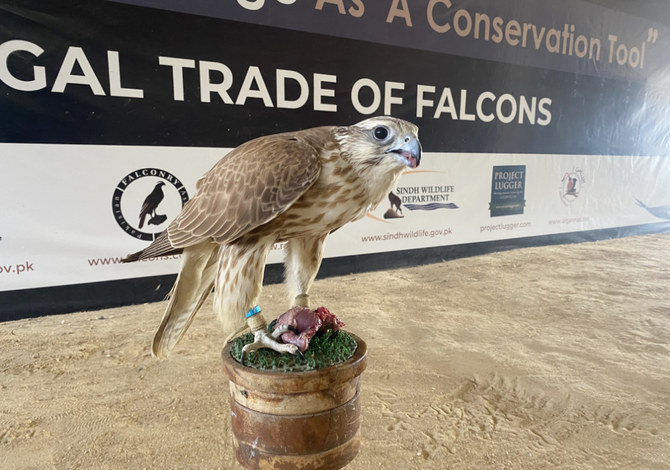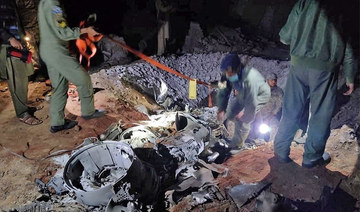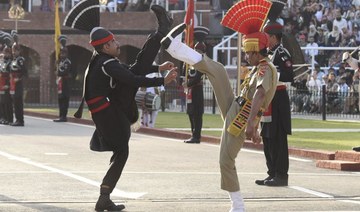KARACHI: In October 2020, customs officials in Pakistan told local media they had seized 75 falcons and a houbara bustard from alleged smugglers during two separate raids in Karachi, putting the value of the birds in excess of $1 million.
Sixteen months later, 71 of the 76 birds are dead after a saga of lengthy trials in multiple courts, legal and inter-departmental wrangling over the fate of the birds, and an inability by officials to provide them with a suitable habitat since confiscation.
On Oct. 21, 2020, five days after the birds were seized by Pakistan Customs, a customs court dismissed the argument that the case involved smuggling, saying the birds had not been seized at an entry or exit point of the country. However, the court acknowledged that the episode was a violation of a provincial wildlife law passed in 2020, and ruled that the birds would remain in the custody of Pakistan Customs. The case was subsequently referred to a trial court, which was ordered by the Sindh High Court on March 11, 2021.

A falcon is seen in a cubicle at the Customs Preventive Service Club and Sports Complex in Karachi on Feb. 28, 2022. (AN photo)
Javed Mehar, a conservator at the Sindh Wildlife Department, told Arab News the department submitted a document to the trial court, calling for a “summary trial” under relevant laws to ensure the birds could be immediately released.
“In case of delay, there are greater chances of (their) mortality,” the document, seen by Arab News, said.
During the course of the trial court hearings, the owners of the birds produced licenses issued by the chairman of the Wildlife Management Board. The court accepted the claim of legal ownership and ruled in the owners’ favor on May 31, a decision that was appealed by both the wildlife and customs departments. Therefore, despite the favorable ruling, the birds were not released.
Aslam Gabol, who owned 55 of the 76 birds, said his family had been “legally” trading in birds for decades.
“Both the customs and trial courts handed down judgments in our favor because we presented every fact, that we are openly trading these birds under the government’s license and it’s completely legal,” Gabol told Arab News. “We hadn’t kept the birds at any hidden location and we have never kept our business hidden as we have got proper license each year … and have maintained its record.”
Gabol said his family usually purchased the birds from Pakistan’s Khyber Pakhtunkhwa and Balochistan provinces, as well as from Afghanistan, and sold them to clients abroad, mostly in the Middle East.
A second owner, Basheer Buledi, said his family had been in the trade since 1972.
“We are trading the falcons as per law and had kept them at the same address as mentioned on the permit,” Buledi told Arab News. “Had this been an illegal business or if we were doing it secretly, I would have not kept the birds at my home.”
Buledi said the decision of the courts was “testimony of the fact that we had done nothing illegal.”
He asked: “How can it be a case of smuggling when the birds were not seized at any air or sea port or Sindh’s border with another province?”
However, Mehar quoted a directive from the Forests and Wildlife Department under which all new licenses were banned and old ones terminated on Feb. 11, 2019. That directive was appealed and rejected by the Sindh High Court and thus, Mehar argued, there was no law under which the owners of the birds could be in possession of their licenses.
Mehar also said the Wildlife Management Board had been defunct since 1996 and had not been allowed to issue permits since. There was also no provision to allow for hunting or possession licenses under the new wildlife law of 2020, he said.
Sardar Muhammad Usman Almani, chairman of the Sindh Wildlife Management Board and its chief game warden, said while he had issued private game and mini-zoo licenses under the Sindh Wildlife Protection Ordinance 1972, he did not “recall” signing any possession licenses after assuming office in May 2019.
When he was shown a copy of the licenses submitted by the owners of the birds in court, Almani said he would check his records but did not return with an answer.
Eight months after the ruling in favor of the birds’ owners, the High Court is yet to hear the appeal filed by the customs and wildlife departments.
But even as the trial dragged on, customs and wildlife officials, as well as the Pakistan Falconry Association, said they had made a last-ditch effort to save the birds by having them moved to the colder northern Gilgit-Baltistan region. Their attempts, however, proved futile as the court did not grant permission.
In March last year, Kamran Khan Yousafzai, who heads the PFA and the Raptor Center for Rehabilitation and Conservation, wrote to the Pakistan Ministry of Climate Change that the birds needed to be moved to Gilgit-Baltistan because their survival was difficult in Karachi.
“Weather is becoming hot and temperature is rising in Karachi, and falcons are facing extreme dehydration,” Yousufzai wrote in his letter. “It is becoming impossible to maintain the health of falcons in high temperatures. Delayed release process of falcons is causing increased threat to their survival.
“The falcons cannot survive in temperatures exceeding 34 C,” Yousafzai told Arab News, adding that the ministry also agreed to the proposal to shift the birds.
“However, the court did not allow customs or the ministry to move the birds to Gilgit-Baltistan,” he said, and so the birds remained in Karachi, where they died one by one.
Legal experts say reform is needed to ensure the situation is not repeated.
Salahuddin Ahmed, a legal expert and president of the Sindh High Court Bar Association, said he believed Pakistani laws regarding the storage of case property — in this case the confiscated birds — needed to be updated.
“Keeping animals for so long is pointless,” he said. “Forget animals, I frequently see cars rusting away during legal trials just because they are case property.”
Iftikhar Khan, the customs intelligence officer who seized the birds, said the lengthy court proceedings had not only led to the death of the falcons but would now discourage officers from pursuing smugglers in the future.
“Hundreds of falcons are traded on the Pakistani black market,” he said, “but who will conduct a raid now? Any raid against such smugglers will result in the murder of birds. That is the lesson we learn from this story.”
































